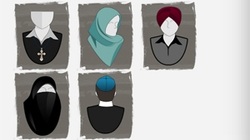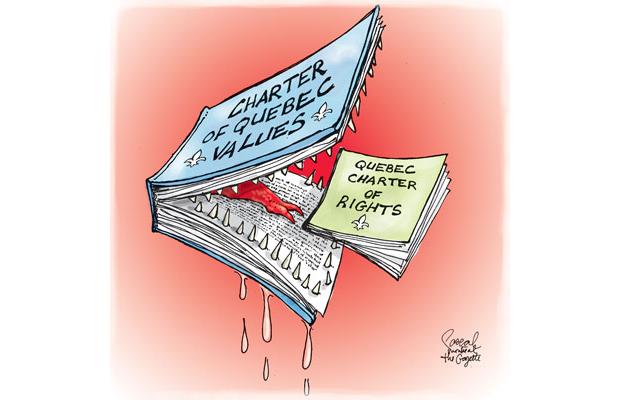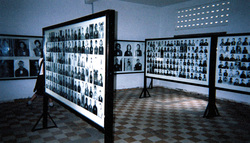This cartoon by cartoonist Pascal from the September 13 2013 Montreal Gazette deals with the Charter of Quebec Values proposed by the ruling Parti Quebecois. In the cartoon, the Charter of Quebec Values is portrayed as a vicious monster who is salivating over the possible destruction of the Quebec Charter of Rights. The Quebec Charter of Values would ban the wearing of any "overt and conspicuous religious symbols by state personnel in carrying out their duties". That includes judges, police, school teachers, hospital workers, municipal employees and judges. It also bans any clothing that would cover the face of anyone who wants to receive government services.
A recent poll says that the charter has strong support for Quebecois from outside urban areas, the middle-aged, people with less than a high school education, and people for whom French is their mother tongue.
A recent poll says that the charter has strong support for Quebecois from outside urban areas, the middle-aged, people with less than a high school education, and people for whom French is their mother tongue.
- Should religious symbols be banned? If so, why? Does banning the wearing of religious symbols interfere with the rights and freedoms of the individual over the collective norms of society? Should common "values" trump individual "rights"?
 http://www.nosvaleurs.gouv.qc.ca/en/propositions/3
http://www.nosvaleurs.gouv.qc.ca/en/propositions/3 The image to the left shows symbols that would not be allowed under the charter. The main reason given by the government is to affirm the equality of men and women and to unify the people of the province. According to the government, " This restriction would reflect the state’s neutrality. "
What message is the cartoon conveying? How is it linked to liberalism? The source is trying to say that when a government action interferes with people's individual rights to express their beliefs, it is wrong. Rights are more important than values. It relates to the principle of individual rights and freedoms, which is a key principle of liberalism. Values, especially collective values, are not identified as a principle of liberalism. The source also relates to the collectivist principles of collective interest and collective responsibility.
The Charter promotes equality. No one should promote their own personal beliefs when they provide a government service. By doing so, the Charter interferes with individual rights. It tells people of all religions they have to put their beliefs aside when they work for the common good as government employees. It also implies that women who wear head coverings as part of their religion are oppressed. They wear the hijab because their culture treats them as less than equal.
I can see both sides on this issue. On the one hand, I think everyone has the right to practice their own religion. But what if that religion discriminates against others? Or discriminates against women? What if it gets in the way of their work? If I was a Muslim student in a classroom where the teacher wore a big crucifix every day, will I think I am being understood? If my doctor wears a burqa, how can I read her face? This is an interesting dilemma for all Canadians. We are all about multiculturalism, and we think everyone is equal- even if it is equal but different. When you work for the government, you are supposed to be neutral. Just the other day, I went to get my drivers licence renewed. Our registries office is privately run and the people who own it are members of a fundamentalist sect. The office is full of religious tracts trying to convert people to their way of thinking. Should their beliefs be in my face when I go to receive a mandatory government service? Or should people check their religion at the door when they go to work?
The Charter promotes equality. No one should promote their own personal beliefs when they provide a government service. By doing so, the Charter interferes with individual rights. It tells people of all religions they have to put their beliefs aside when they work for the common good as government employees. It also implies that women who wear head coverings as part of their religion are oppressed. They wear the hijab because their culture treats them as less than equal.
I can see both sides on this issue. On the one hand, I think everyone has the right to practice their own religion. But what if that religion discriminates against others? Or discriminates against women? What if it gets in the way of their work? If I was a Muslim student in a classroom where the teacher wore a big crucifix every day, will I think I am being understood? If my doctor wears a burqa, how can I read her face? This is an interesting dilemma for all Canadians. We are all about multiculturalism, and we think everyone is equal- even if it is equal but different. When you work for the government, you are supposed to be neutral. Just the other day, I went to get my drivers licence renewed. Our registries office is privately run and the people who own it are members of a fundamentalist sect. The office is full of religious tracts trying to convert people to their way of thinking. Should their beliefs be in my face when I go to receive a mandatory government service? Or should people check their religion at the door when they go to work?


 RSS Feed
RSS Feed